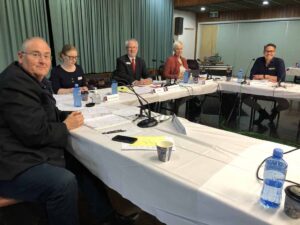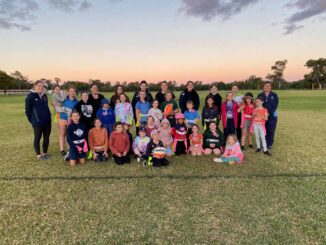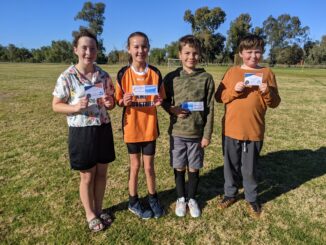
As part of a parliamentary inquiry into health outcomes and services in rural, regional and remote areas of NSW, members of the committee were in Cobar on Friday to hear first-hand issues that locals were experiencing with the health system.
Chair of the Upper House Health Committee, the Hon Greg Donnelly MLC, said this was a critical stage of the inquiry process.
Mr Donnelly praised the local community members who gave evidence to the inquiry and also residents from Bourke and Condobolin.
“This is the second day of our public hearings, which are going to run through to December this year,” Mr Donnelly said.
“With the production of a report and recommendations early in the new year, it just would not be possible for us to do an inquiry without coming out to the communities to hear first hand from various individuals through to organisations and stakeholders and everyone in between, about matters associated with health and medical issues and outcomes in those communities.”
Mr Donnelly said the quality of the evidence they had heard at the Cobar hearing had been “excellent”.
“In two respects, we received very good submissions that people produced and sent to the inquiry Secretariat, which we’ve had a chance to read and look at, and that’s provided excellent insights into the matters.
“And then that’s been backed up today, with people coming along, and providing addition-al information about their evidence,” Mr Donnelley told The Cobar Weekly at the conclusion of Friday’s proceedings.
“And importantly, it was an opportunity for us to probe them a bit about the points they rise to clarify and provide more information.”
Mr Donnelly said throughout the inquiry process the panel has heard a number of con-fronting personal accounts and they have also been made aware of a number of problems with the health system In addition to Mr Donnelly acting as chair, the inquiry panel was made up of members of all the major political parties, including the Hon Walt Secord MLC (Labor), Ms Cate Faehrmann MLC (Greens), Hon Wes Fang MLC (Nationals) and the Liberals’ Hon Lou Amato MLC.
At Friday’s hearing in Cobar the panel heard from Cobar Shire Council’s mayor Peter Ab-bott and general manager Peter Vlatko along with Bourke Shire Council’s mayor Cr Barry Hollman and manager of corporate services Leonie Brown.
Cr Peter Abbott told the inquiry that “we need to take a more risk-based approach to funding and manning levels to health”.
He said the attitude of the health system seems to be ‘reactive’ rather than ‘proactive’ and is based on a set criteria that does not give any consideration to any type of risk assess-ment based approach.
“If such an approach was adopted, Cobar sits on the crossroads of the major highways and has five operating mines within 90kms.
“They would surely qualify for a higher level of service provision as the risk of both major, and the likelihood of increased rates of minor injuries, would be greater,” Cr Abbott said.
He suggested that locating more medical services in Cobar would also be of financial benefit. Cr Abbott provided data that showed that in the financial years, 2017/18 and 2018/19, 174 people were flown out of Cobar for further medical treatment “which cost the government just under one million dollars”.
“That’s one person being flown out every four days,” Cr Abbott said.
“Data showing the reasons for these patients being flown out could be gathered to ascertain if having certain medical professionals eg mid-wives, a fracture clinic and certain equipment like a CT scanner or MRI, on the ground in Cobar could provide a better outcome for a lower cost.”
Cr Abbott also suggested incentives be in-vestigated to attract and retain doctors to rural areas which he believed would also be a better option financially than for the health service to continuously fly locum doctors in and out to work at the hospital.
He told the panel that the health system seems to have “no appreciation for distances travelled in rural areas which includes the per-ception that Cobar is geographically located around Narromine!”
He spoke about incidents where patients from Cobar have been transported to Dubbo Base Hospital for treatment and then later “discharged at all hours of the night and told to find their own accommodation or their own way home”.
Cr Abbott said he is aware that some people have been left stranded “with nothing but the clothes they’ve got on”.
“This will certainly be repeated across the many Western region towns that feed patients into Dubbo, which is supposedly designed and run as a regional hub but seems to have no ability to cater for patients other than Dubbo residents.”
He suggested to the panel that more thought needs to be given as to how these patients could be better managed with regards to ac-commodation and transport options.
Bourke Shire Council’s representatives reit-erated that their residents had experienced similar problems.
Mr Donnelly said it was the first they had heard evidence of rural patients who were transferred to larger regional hospitals like Dubbo and being “thrown out” in the middle of the night.
Bourke’s representatives urged the panel that telemedicine should not be considered as being a replacement for a doctor on site.
“For a number of the committee members, this was the first time really the penny’s dropped with the point about the way in which telemedicine in many respects is quite inappro-priate in terms of application for certain as-pects of delivering health care and services.
“It’s one thing to say, well, listen, it’s new technology, and we should use it.
“And of course, we welcome the use of tech-nology and using it, where it is helpful and assists, but it must not become a substitute for actual doctors and nurses and allied health workers to provide human care,” Mr Donnelly said.
“A number of witnesses have said, and these are people with some expertise, and particular-ly nurses, who are very much at the cutting edge of this, that seeing the actual use of the technology doesn’t enable the person to have contact, and particularly eye contact and even touching and checking parts of the body to do what would normally be done in a doctor pa-tient relationship, say in a doctor’s room.
“So therein lies some real challenges of en-suring that the technology is used in the most advantageous way, but is not used to substitute out doctors and healthcare workers and others.
“So that was a very good point,” Mr Donnel-ly said.
As part of their evidence both councils out-lined the financial support they have been providing in an effort to attract doctors and various allied health services to their towns with members of the panel suggesting that matters like this should be State Government funded rather than local councils footing the bill.
In Cobar the panel also heard first hand ac-counts of their experiences of the health sys-tem from private Cobar residents Ally Pearson and Geoffrey Langford along with Condobolin nurse Pen McLachlan, members of the Condobolin Doctor Crisis Working Party as well as Western NSW Local Health’s chief executive Scott McLachlan and their rural director of medical services, Dr Shannon Nott.
“We’re very grateful for the community for participating so enthusiastically,” Mr Donnelly said.
He said the panel will endeavour to produce the best report they can highlighting all of the issues presented to them along with their rec-ommendations.
“We do hope the Government, and particu-larly the Health Minister, will take up those recommendations and proceed with them.”


